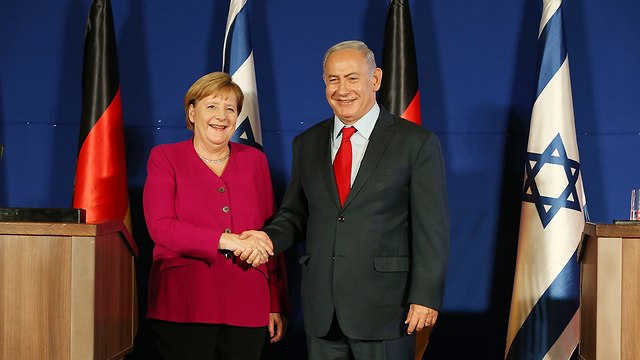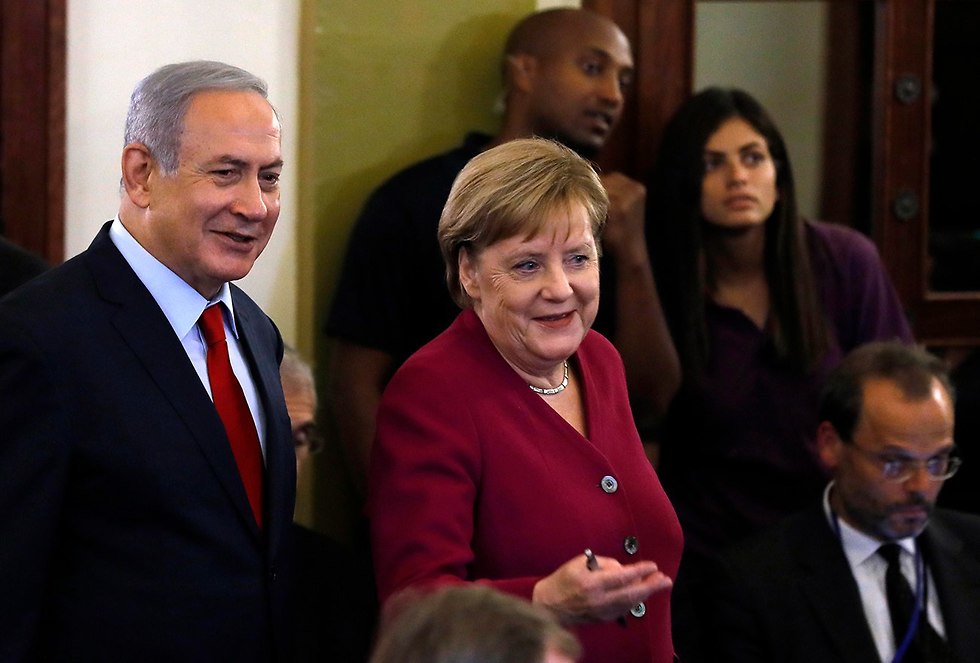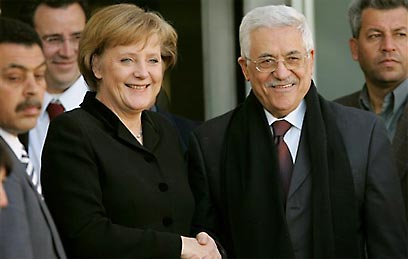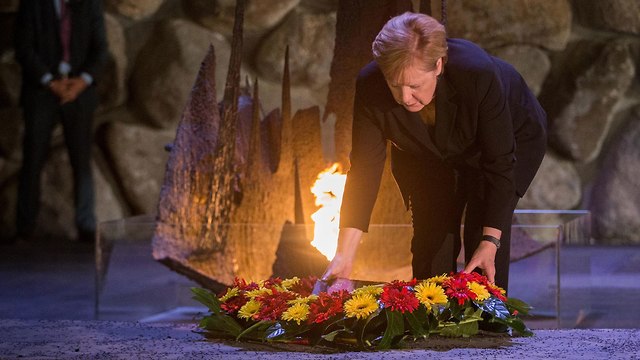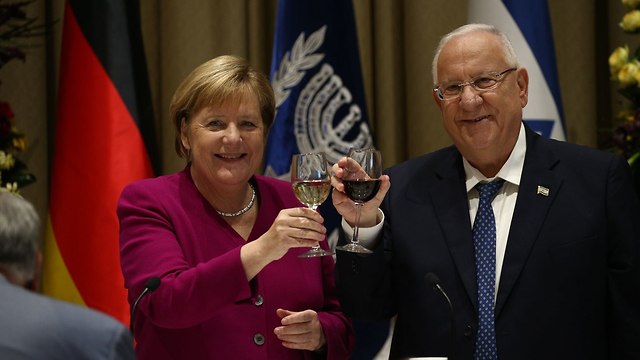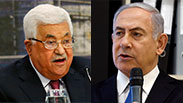
Netanyahu to Abbas: 'stop strangling Gaza'
At a press conference with German chancellor Merkel, prime minister sends a message to the Palestinian president: 'If Hamas thinks it can attack Israel, it will be making a mistake— our response will be very harsh'; German chancellor downplays the countries' dispute over Iran, saying the sides are 'absolutely in agreement.'
Prime Minister Benjamin Netanyahu slammed Thursday Palestinian President Mahmoud Abbas for transferring funds to Hamas during a press conference with German Chancellor Angela Merkel in which the two displayed unity, despite gaping disagreements.
German Chancellor Angela Merkel was in Israel for two days of joint government consultations, the seventh such trip since Israel and Germany established the tradition a decade ago.
Merkel and Netanyahu appeared together at a press conference where the prime minister addressed the possibility that Hamas would attack Israel as a result of its people's financial distress.
"If Hamas thinks that as a result of this plight it can attack Israel— it will be making a major mistake. Our response will be harsh, very harsh. I hope that it is possible to halt this strangulation but I also reiterate that Israel will act with all necessary strength to defend itself and its citizens," Netanyahu stressed.
"The situation in Gaza may be divided in two. First of all, the permanent effort by Hamas to arm itself and organize against Israel. Second, in the last year Abbas has made the situation in Gaza more difficult by choking off the flow of funds from the Palestinian Authority to Gaza," he explained.
"Abbas has interfered in all UN attempts to ease the plight in Gaza, including now. Many countries, today I can say that even the donor countries are condemning him for this, and rightly so," the prime minister continued.
Referring to the chances for peace in the Middle East, the prime minister said that the Iranian threat "brought Israel and the Arab states close as never before. I believe that this new relationship is a great hope for the future because it paves the way for peace between Israel and the Arab states, although it will take time and it normalizes gradually. I think ultimately it will help us reach peace with our Palestinian neighbors if they decide to embrace peace instead of trying to squeeze Israel into impossible conditions."
Netanyahu made his remarks on the backdrop of the IDF's decision to reinforce troops around the Gaza Strip on Thursday as a precaution against incursions by Palestinians during violent protests along the border.
Earlier at the press conference, Netanyahu addressed Merkel and thanked her for her unrelenting support for Israel's security, and Berlin's unreserved stance against anti-Semitism.
The prime minister also divulged some information concerning the meeting the two leaders held prior to the press conference. "We identified several areas to increase our cooperation. We signed agreements on trade, the environment, energy, transportation and housing. There are very, very few economies in the world today that have our capacity...but we also have to defeat the forces that want to drag us into the past—Islam, and primarily the forces of ISIS on the one side, and Iran and its proxies on the other side."
On the subject of Iran, Netanyahu says the nuclear deal, which curbed Iran's nuclear program, does not include enough safeguards to prevent the Islamic Republic from developing a nuclear weapons capability.
"It's not a secret, certainly not a state secret that I opposed the deal with Iran because…it paved its way to a nuclear arsenal…and put billions of dollars in the hands of the leading aggressor in the Middle East–Iran, which had extended its aggressive activity to Europe as well," the prime minister said.
"I believe that all nations must join together to press the Iranian regime to fully dismantle its nuclear weapons program. Iran, ultimately, has to get out of Syria altogether. Israel will continue to do what we must do to defend ourselves, to defend our state and our people," he asserted.
Referring to the Holocaust and the strong ties between Germany and Israel, the prime minister said the Jewish people "overcome the horrors of the past and never forget", adding that the countries have "transformed its relationship into a warm and constructive friendship."
Merkel, whose rapport with Netanyahu has been cool at times, maintains that Israel will be best served by keeping the Iranian nuclear deal intact, contradicting Netanyahu's demand that it be scrapped and stiff sanctions imposed instead.
At the press conference, however, the German chancellor downplayed the countries' dispute over Iran, saying the sides were "absolutely in agreement" on preventing Iran from obtaining nuclear arms, specifying that the agreement itself was in dispute.
"The region in which you live is very different from ours. I know Israel must defend itself if attacked," she concurred. Merkel also referred to the dangers on the northern border, noting that "the Iranian military presence in Syria and Lebanon poses a threat to Israel."
Merkel began the second day of her trip with an emotional tour of the Yad Vashem Holocaust memorial and museum.
Accompanied by Yad Vashem Chairman Avner Shalev, Merkel took special notice of an exhibited letter that Nazi leader Adolf Hitler sent deployed German soldiers in which he tried to boost their morale by saying they were fighting "a war of existence, a war against communism and its perpetrators, the Jews." She then participated in a memorial ceremony for the 6 million victims of the Nazi-led Holocaust.
At the press conference, Merkel spoke about her visit to the memorial.
"We have a real responsibility for the crimes committed in the Holocaust— and we will pass this responsibility from one generation to the next. Anti-Semitism still exists, and in some parts of Germany it is even on the rise."
Netanyahu also referred to anti-Semitism, saying that "once the Jews were accused of terrible things such as poisoning of wells. Today these charges are directed against the State of Israel."
Earlier on Thursday, Merkel met witrh President Reuven Rivlin.
At the meeting, Rivlin focused his remarks on the Iranian threat. "We cannot appeal the decision made by the European Union to bypass the sanctions imposed on Iran," Rivlin told Merkel.
"This is the time to join the sanctions on Iran, not go around them. The Iranian monster should be starved, not fed," the president stressed.
"This is the only condition to maintaining stability in the region. We ask Germany to stand beside us in the demand for supervision on Iran's nuclear program, and to not allow it to evade its commitments," he added.
Responding to Rivlin, Merkel noted that "we want to prevent Iran from using nuclear weapons. The question is in what way: should we continue with the agreement or build on the sanctions? We're working towards the same goal—to stop the Iranian nuclear program."
"We think that alongside a Jewish state, the establishment of a Palestinian state is the right answer, our commitment to Israel is deep, but Israel is the only democracy in the region and it is important to emphasize this face," she said.
During her short 24-hours visit, Merkel met Netanyahu for dinner Wednesday night and their ministers were set to sign a series of new agreements, including scientific exchanges and joint projects in cyber security, artificial intelligence and nanotechnology.
The chancellor also visited the Israel Museum, where she received an honorary doctorate by the University of Haifa, toured an innovation exhibit of Israeli and German companies, and headed a round table with the prime minister.
Merkel was accompanied by much of her Cabinet, a large business delegation and a new official in charge of combating anti-Semitism. At 7pm Thursday, the German leader was already on her way back to Berlin.











